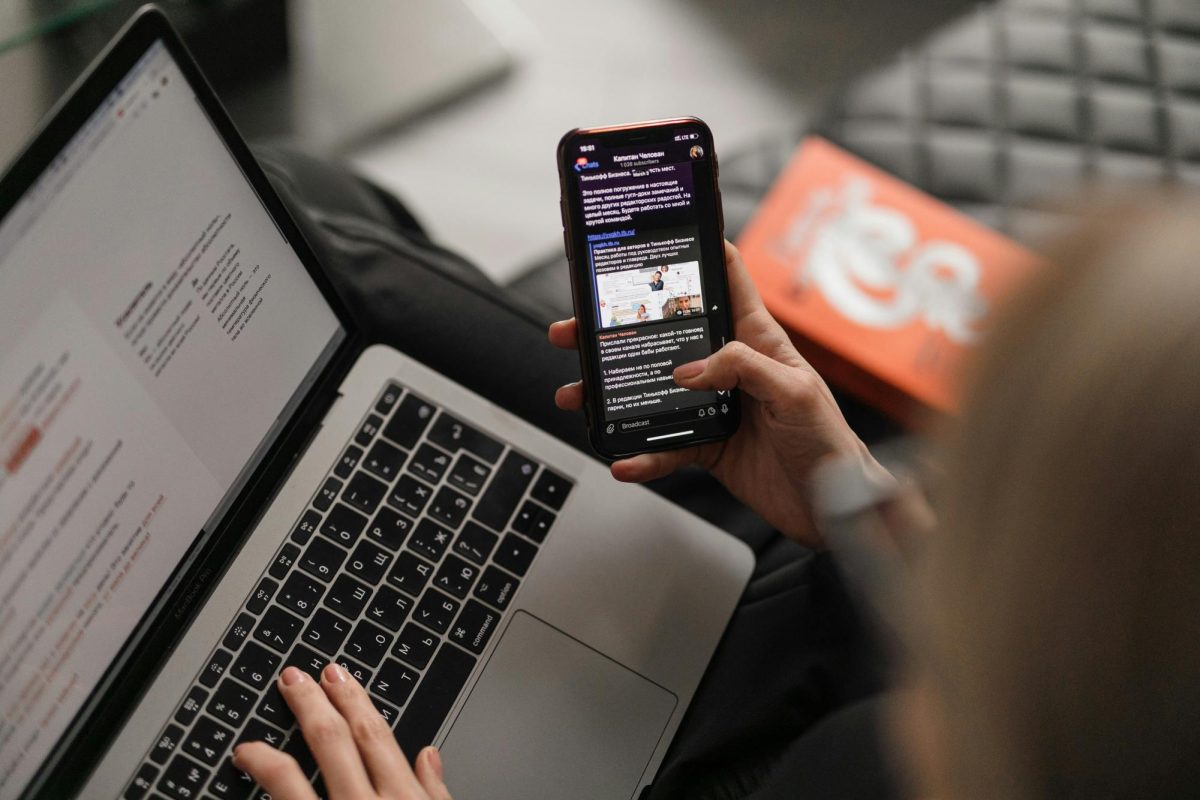As technology becomes more influential in daily life, many people debate over what is best for students when it comes to cell phone usage in school.
Staff writer Karlie Zabrocki shared her opinion on the topic:
What are the odds of you finishing the work sitting on your desk if your phone is buzzing and begging to be picked up? Not likely. Phones cause a huge distraction in schools with students and staff.
A recent AJC article cites that twelve years is the amount of time an average American spends on their smartphones during their life which is a result of an average use of 4 hours and 37 minutes a day.
Phones demolish your work habits. It’s commonly known that multi-tasking doesn’t work and if your brain is constantly being interrupted by your phone, your work will take twice as long to complete. Studies have shown that once your brain gets distracted, it can take up to 20 minutes to get back into its working cycle. This can result in missing valuable information which can be crucial for your grades.
Your collaboration skills severely decline when you’re on your phone affecting working memory. Imagine being in a group project and your phone keeps buzzing. At this point, the phone is not just a distraction impacting you but it also affects the group members with you.
The only way to fix this problem is for schools to take cellphones. It’s indisputable that cell phones have been proven to be a distraction among teenagers. Eliminating this will help students complete their work and learn information efficiently.
At Roswell, many of the teachers use cell phone pouches or lock boxes to collect cell phones at the beginning of class. This has been an effective way for teachers to have an attentive class and have more collaboration throughout the classroom. For example, in my honors Biology class, students work together and share their work when their phone is collected.
A prevalent argument is students might have an emergency and need to contact their parents or trusted adult. This problem can be easily avoided because once the period ends, the student can get on their cell phone during class transitions to contact their friends and family. If the student needs to contact their parents immediately, then they have the right to ask their teacher if they could step into the hallway or text them silently and efficiently.
As technology advances, phones in the classroom will become more of a distraction. This can lead to grades dropping and productivity declining. If we start pushing for more phone restrictions, we can stop future problems and interruptions.
Staff writer Anderson Small represents an opposing point of view, writing about his perspective on cell phone restrictions.
Cellphones have a huge influence in schools today, just about every student carries a phone on them, and schools find this an issue. Some people have been complaining that cellphones are only distractions that only hurt students, but cellphones provide a way for students to get access to knowledge very quickly, which they normally wouldn’t be able to get that fast. Cellphones also provide a way for students to interact with other students. From being able to bond over shared games, to watching the same TV show, cell phones provide positive attributes for students, and staff.
Cell phones also provide a way to contact parents while at school. If cell phones are banned on campus, how will students be able to contact their parents during the school day? Some people may argue that contacting parents during the school day isn’t a big deal and people can live without talking to them, but sometimes students may have an issue, and need to be picked up early. Having a cell phone on them would provide a quick and simple way for students to message their parents about what is going on.
Parents would also be able to contact their child in case something came up. For example, if the student is normally a car rider, but their parents wouldn’t be able to pick them up. This way the parents would be able to easily communicate with them, to tell them that they need to go home on the bus that day. Cellphones also provide a way to get help if needed. Let’s say something happens to a student with no teacher around, they would be able to call for help with their phone.
Some people may argue that cellphones provide a way for students to cheat on quizzes and tests, so they perform well and pass the class. There are many ways to get past this without banning cellphones. The teacher could impose a rule to make students turn in their phones at the beginning of every test and quiz, and they can be allowed to get them back once they are done. This rule would make it so that students wouldn’t be able to cheat and makes it so that they wouldn’t feel restricted.
Students get bored throughout the day. Many kids finish their assignments early and have nothing left to do. Cellphones give those kids something to do while they wait. Cell phones provide a bunch of ways for students to do stuff, from playing games, to watching a show, cell phones act as a great time passer.
In many places, cell phones have already been banned, if this ban spreads to all schools, the students may get mad and start to protest. A protest could be an issue for some schools. Protests would cause an issue for the school because students could not try as hard as they used to or act worse than they did before. According to a protest has already occurred with students skipping classes, to protest the stricter rules on cellphones. It has caused many students to get angry, which has causes issues for the school.
There are many ways to get around the ban and get the same results as if there was a ban. Teachers can just make the students put up their phones, and it would accomplish the same job. If schools did this then there wouldn’t be such an issue regarding cellphones at schools.








